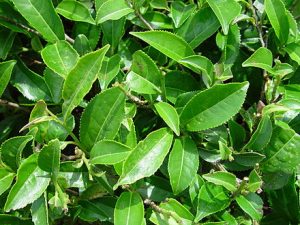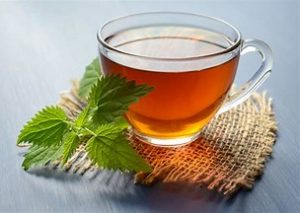I think we can all agree that a cup of tea is almost 100% water – before you add cream and sugar. So tea is a good alternative to water, right? Well, let’s take a look…
What exactly is “tea”?
 According to Wikipedia it’s “an aromatic beverage commonly prepared by pouring hot or boiling water over cured leaves of the Camellia sinensis, an evergreen shrub (bush) native to East Asia. It originated in southeast Asia, specifically around the intersection of latitude 29°N and longitude 98°E, the point of confluence of the lands of northeast India, north Burma, southwest China and Tibet. From here its popularity spread to more than 52 countries.
According to Wikipedia it’s “an aromatic beverage commonly prepared by pouring hot or boiling water over cured leaves of the Camellia sinensis, an evergreen shrub (bush) native to East Asia. It originated in southeast Asia, specifically around the intersection of latitude 29°N and longitude 98°E, the point of confluence of the lands of northeast India, north Burma, southwest China and Tibet. From here its popularity spread to more than 52 countries.
Records show that tea was a popular drink with the Chinese as early as 2nd century B.C. It spread to Japan about the 6th century A.D. becoming a favorite of the religious groups there.
 Tea initially came to America in the 1600’s with the Dutch who started a settlement in New Amsterdam.
Tea initially came to America in the 1600’s with the Dutch who started a settlement in New Amsterdam.
After water, tea is the most popular drink in the world, and nearly 50% of Americans enjoy it every day.
Varieties made from this plant include black, green, white and oolong. These teas typically contain caffeine. Black tea has more caffeine than green tea but the amount of caffeine can vary depending on the process used. The longer it steeps, the higher the caffeine level will be.
*An 8oz cup of black tea contains about 48mg of caffeine.
*An 8oz cup of green tea contains about 29mg of caffeine.
*An 8oz cup of oolong tea contains about 38mg of caffeine.
Tea has a stimulating effect due to its caffeine content and it also offers many health benefits which have been widely reported. One of these is the antioxidants found in tea.
Caffeine is a mild diuretic but according to my sources the fluid you consume in your cup of tea tends to offset the fluid loss when you urinate. Here’s what I found:
Our daily intake of caffeine should not exceed 400mg. Rounding up the numbers I cited above we can see by doing some simple math that:
*Black Tea: You’d have to drink 8 cups to reach that level.
*Green Tea: You’d have to drink about 13 cups to reach it.
*Oolong Tea: You’d have to drink 10 cups to get there.
Conclusion: “Moderate” amounts of tea enjoyed daily will not cause dehydration. Use your common sense and be aware of any physical discomfort you experience like any problems you have sleeping. Make any adjustments you deem necessary, like drinking less, or drinking earlier in the day so you don’t have any trouble with sleep. Drinking more water will help too.
Warning: If you drink 6-13 cups daily, over time you are likely to experience some dehydration.
Bottom Line: Yes…Tea is a good addition to your daily fluid intake.
Enjoy!
https://www.bing.com/search?q=tea+wikipedia&PC=U316&FORM=CHROMN
https://en.wikipedia.org/wiki/History_of_tea
https://www.eatright.org/health/wellness/preventing-illness/the-health-benefits-of-tea
